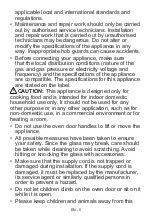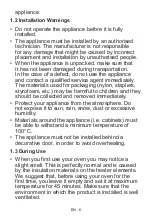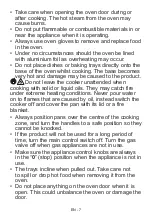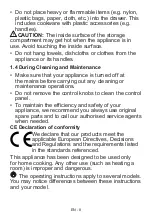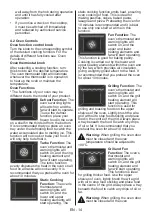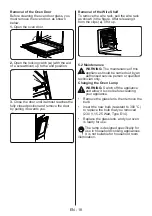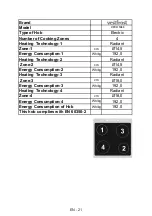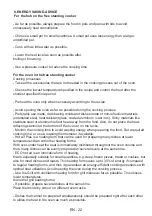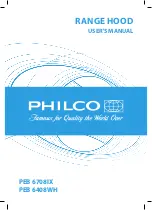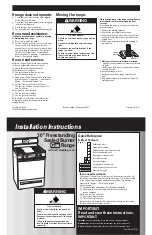
EN - 17
cloth and dry it.
• You may need to use a liquid cleaning
material occasionally to completely
clean the oven.
Cleaning the Ceramic Glass
Ceramic glass can hold heavy utensils but
may be broken if it is hit with a sharp object.
WARNING :
Ceramic Cooktops - if the
surface is cracked, to avoid the
possibility of an electric shock, switch
off the appliance and call for service.
• Use a cream or liquid cleaner to clean
the vitroceramic glass. Then, rinse and
dry the glass thoroughly with a dry cloth.
Do not use cleaning materials meant
for steel as they may damage the
glass.
• If substances with a low melting point
are used in the cookware’s base or
coatings, they can damage the glass-
ceramic cooktop.If plastic, tin foil, sugar
or sugary foods have fallen on the hot
glass-ceramic cooktop, please scrape
it off the hot surface as quickly and as
safely as possible. If these substances
melt, they can damage the glass-
ceramic cooktop. When you cook very
sugary items like jam, apply a layer of a
suitable protective agent beforehand if it
is possible.
• Dust on the surface must be cleaned
with a wet cloth.
• Any changes in colour to the ceramic
glass will not affect the structure or
durability of the ceramic and is not due
to a change in the material.
Colour changes to the ceramic glass may
be for a number of reasons:
1.
Spilt food has not been cleaned off the
surface.
2.
Using incorrect dishes on the hob will
erode the surface.
3.
Using the wrong cleaning materials.
Cleaning the Glass Parts
• Clean the glass parts of your appliance
on a regular basis.
• Use a glass cleaner to clean the inside
and outside of the glass parts. Then,
rinse and dry them thoroughly with a dry
cloth.
Cleaning the Enamelled Parts
•
Clean the enamelled parts of your
appliance on a regular basis.
•
Wipe the enamelled parts with a soft
cloth soaked in soapy water. Then,
wipe them over again with a wet cloth
and dry them.
Do not clean the enamelled parts while
they are still hot from cooking.
Do not leave vinegar, coffee, milk, salt,
water, lemon or tomato juice on the
enamel for a long time.
Cleaning the Stainless Steel Parts (if
available)
• Clean the stainless steel parts of your
appliance on a regular basis.
• Wipe the stainless steel parts with a soft
cloth soaked in only water. Then, dry
them thoroughly with a dry cloth.
Do not clean the stainless steel parts
while they are still hot from cooking.
Do not leave vinegar, coffee, milk, salt,
water, lemon or tomato juice on the
stainless steel for a long time.
Cleaning Painted Surfaces (if available)
• Spots of tomato, tomato paste, ketchup,
lemon, oil derivatives, milk, sugary
foods, sugary drinks and coffee should
be cleaned with a cloth dipped in warm
water immediately. If these stains are
not cleaned and allowed to dry on the
surfaces they are on, they should NOT
be rubbed with hard objects (pointed
objects, steel and plastic scouring wires,
surface-damaging dish sponge) or
cleaning agents containing high levels
of alcohol, stain removers, degreasers,
surface abrasive chemicals. Otherwise,
corrosion may occur on the powder
painted surfaces, and stains may occur.
The manufacturer will not be held
responsible for any damage caused
by the use of inappropriate cleaning
products or methods.
Summary of Contents for VFCH 1060
Page 115: ...52335517...



